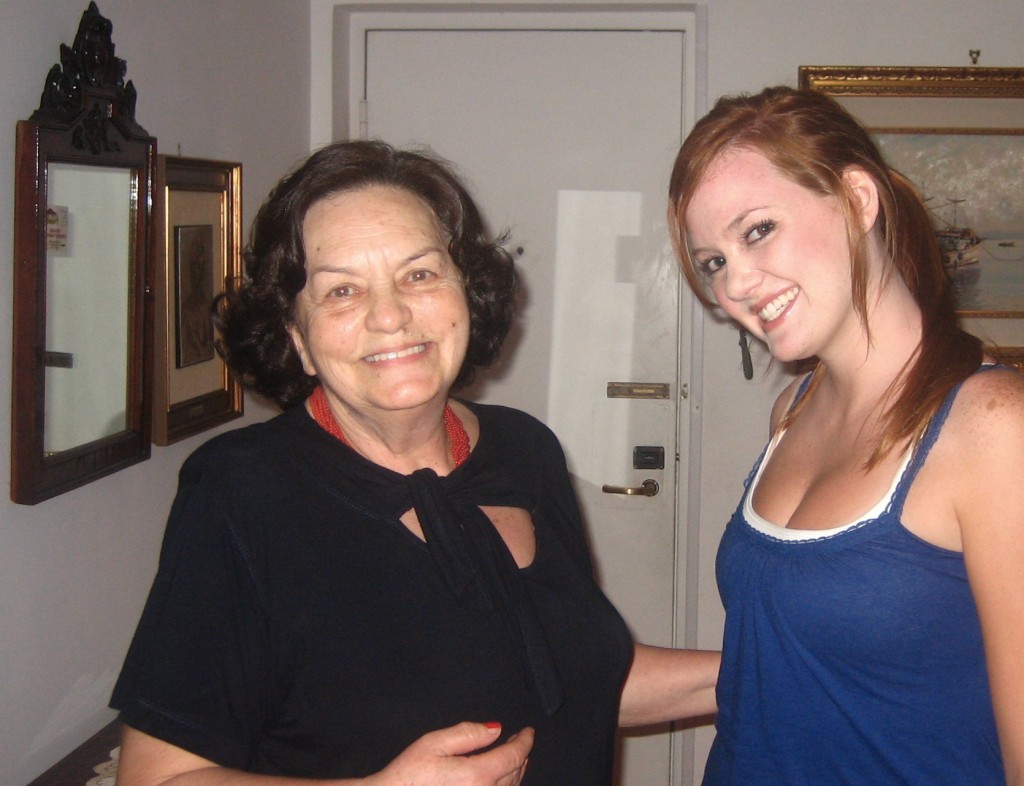BUZZZZZ! BUZZZZ! “Non lo so! Non lo so!”, my driver Giovanni kept saying as he pressed the buzzer to my new home for the next month. 18 years old and for the first time in a foreign country alone, I began to wonder what I got myself into as it appeared nobody was home.
Hand gestures and phone calls commenced as I sat on my suitcase wondering why my Italian host family wasn’t answering their bell. Did they already regret their decision? Will I have to live on the street? Questions in my mind mixed with an overzealous imagination that errs on the worried side more than the carefree.
Coming from an insignificant doorway, an older woman and a young girl walk/jogg out to unlock the gate. Once Giovanni sees someone has answered the bell, he couldn’t have climbed in to his van faster. Well, there goes my first friend in Sorrento.
The grandmother-granddaughter pairing didn’t greet me with hugs like I imagined. In fact, I didn’t know what I imagined, signing up to live with a host family for a month in Sorrento, Italy. The grandmother began grabbing my bag even to my English-Italian protest. “Faccio io! Faccio io!”, she kept saying. With jet lag and fear hanging over, all of the Italian I had picked up in one year in a classroom in California soared out into the Sorrento sky. Tongue-tied and tired, they showed me to my room, pointing to the shower. I can take a hint in any language. “Alle otto per cena, OK?” I mustered up a “Sí” and went straight for the shower.
Buzzzz! Buzzzz! My finger pressed the doorbell to my host family’s main house, the Santostasi familia. On the other end of the wooden door, four women gathered, looking anxious and excited at the same time. I was quickly introduced to Anna Maria, her daughter, Luciangela, and her two daughters, Annabella and Aurora.
Ushered out to their terrace for dinner, I sat down awkwardly as I heard Volare playing from a nearby apartment. I seemed to have found myself on a movie set of what dinner with a southern Italian family would resemble. That awkwardness would soon fade as the days went on. Not knowing how to communicate with people you first met feels akin to having your mouth taped shut and arms tied behind your back. You would love to remove the tape, but you don’t have the arms to do so.
Luciangela warns before diving into my first plate of pasta at the Santostasi household, “You don’t leave here without gaining weight. La cucinia di Nonna!” I found Luciangela to be accurate in her statement, probably 5 pounds later.
Nightly, these conversations over too much pasta and oil turned into lessons on what it meant to be Italian, from speaking to acting. The family of women proved strong. Luciangela was a gymnastics teacher with a passion for performance. Annabella hated her name in typical teenage fashion. Aurora, 7 years old, would always speak to me as fast as she did with her mother. A child doesn’t have the patience to sit there and slow language down. Keep up or else seemed to be her motto.
“The Nonna”, Italian for grandma, as I grew to call her, didn’t speak a word of English. Well, that’s not true. Strangely she knew the word ceiling. She became family, the woman who sat with me in the morning as I sipped on espresso and munched on Italian cornflakes. She would ask me questions repeatedly. If I had no clue what she was saying, it didn’t matter. The Nonna would keep at it by finding a different way of phrasing the question or by bringing in props to lend meaning.
The Santostasi familia not only gave me my first taste of Italian in practice but also travel in essence. Up until that point in my life, every trip I had made was connected to family. Nothing was my own. Nothing was a complete self-achievement. I kept coming back to why I came here, to learn Italian. Woven into my love of the language was a desired to cover the country on my own, to travel independently devoid of familiarity to cling to.
My Italian strengthened more in one month than it did spending a year studying in California. It was the emotional attachment with this family, the nightly dinners, the morning coffees. I had to speak Italian, but I also wanted to, to better understand the Nonna and her generations of women seated around the table.
As I said goodbye in the early hours of the morning to catch my flight home, the Nonna handed me a glass jar filled with artichokes. Never seeing much emotion from her besides laughter and joy, I waved to her from the courtyard I nervously stood in a month before, dumbfounded and clueless when it came to studying Italian. I quickly realized the meaning of language learning. It was for this moment, this connection. Cariciofi, otherwise known as artichokes, is still my favorite Italian word and I suspect the Nonna has something to do with it.
This is my entry for the Pimsleur Approach Language Learning Blog Contest.



A friend of mine quote the following as an Italian greeting:
Hey, we haven’t seen you in a while. How are you doing? How is the family? You look like you have lost weight. Here eat!!
What a lovely memory! Do you keep in touch still?
Sounds like you had a wonderful time, and she sounds like a wonderful lady.